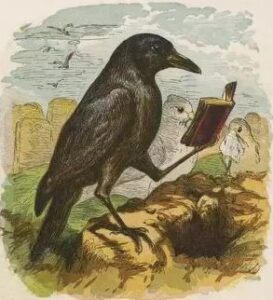Victorian Urban Legends: The Smiths and the Rookery July 8, 2022
Author: Beach Combing | in : Modern , trackback***I’m putting a series of Victorian Urban Legends posts up to draw the reader’s attention to my just released book: The Nail in the Skull and Other Victorian Urban Legends. This legend (with full references) will appear in a second volume. If anyone can fill in missing pieces or offer other sources… I’ll be grateful and you’ll be credited. drbeachcombing AT gmail DOT com. Special thanks to Brian Chapman for help with the rooks***
Rooks are the only British corvid that nests gregariously coming together in rookeries that can, in some cases, number tens of thousands of birds.[1] In Victorian Britain rookeries were a status symbol. Anyone with a large garden or grounds needed their rookery, in the same way that today Tuscan retreats ‘need’ swimming pools or billionaire mansions ‘need’ helipads. Rooks (aka ‘the Black Gentry’),[2] had a reputation for being aristocratic birds. ‘The rooks are looked upon by the Squire as a very ancient and honourable line of gentry, highly aristocratical in their notions, fond of place, and attached to church and state; as their building’ in stately places ‘sufficiently manifests’.[3] Rooks were also reckoned (correctly as it happens) to be extremely intelligent birds.[4] But rooks also had a reputation for deserting rookeries if there was a change in living arrangements: a death, a fall in the family fortune, a new family…
The bright, noble, touchy and insufferably snobbish rook is the hero of the late Victorian story, The Smiths and the Rookery. This 1873 version of the story is the earliest on record.
A party by the name of Smith once brought a mansion in [Wales], and nothing could have persuaded the rooks to abide with the possessor of such a plebeian name, had not an old rook, which went prying among the luggage, as is [sic] arrived from the railway station, found that the boxes were addressed ‘Smythe’… Rooks too aristocratic to remain with plain ‘Mr Walker’ might possibly be persuaded to tarry upon the trees of ‘Squire Waaquere’.[5]
Note the way that the rooks not only turn up their nose at Smith, but have the nouse to read the luggage labels: intelligent birds, indeed!
The difference between Smith and Smythe might seem irrelevant to a non-Briton. But ‘Smith’ is a working-class name: ‘Smythe’ has pretensions to be something rather better. ‘The penny-a-lining sneer at ‘the gentleman of the name of Smith’ seems perennial, while the gibe at the Smyths, for the harmless ‘y’ in their patronymic, serves in the stead of wit’.[6] These attitudes recall Churchill, with equal snobbery, complaining, half a century later, that Slim (perhaps Britain’s most capable Second World War general) was deficient in his surname: ‘I cannot believe that a man with a name like Slim can be much good’.[7]
Another version this one from 1884 actually saw the rooks desert the mansion, but then return.
Yet there are many places where it is believed that a rookery is somehow bound up with the fortunes of the family near whom they build. A good story used to be told about a community of rooks that had settled for generations near the seat of an old family bearing the cosmopolitan name of Smith. The rooks, it is said, left the place in disgust for a time. However, the Smiths having got up in the world, changed the spelling of their name to Smythe, upon which the rooks returned to their former haunts, under the conviction that the Smythes were more worthy of their notice than the Smiths.[8]
A 1904 version is set, meanwhile, in Shropshire and replaces the luggage labels with some vaguer intelligence.
A solemn council was held in the trees, and the birds had just decided that it would be beneath their dignity to be neighbours of such very plebeian folk, when up came one who had been sent to gather information and announced that the newcomers wrote their name Smythe, whereupon the order for departure was immediately cancelled.[9]
[1] Cocker, Crow Country, for rooks.
[2] ‘Rook Shooting’.
[3] Irving, III, 194.
[4] Marzluff and Angell.
[5] ‘The Echo…’; see also Church, 218.
[6] Reade, xii. Brian Chapman passes on to me this exchange from Atlantic Canada around ‘Smythe’ and the snobbery that goes with it. Hiscock, 2014: A coal man has arrived to drop off the coal for Mrs Smythe. The coalman asks Mrs Smith where she wants the coal. ‘‘Young man!’ she answered somewhat haughtily, ‘My name is not Smith. It’s Smythe.’ Like a whip he retorted ‘Smit or Smite. Shit or shyte. Where do you want your coal?’’
[7] Anderson, 300.
[8] R.N.
[9] ‘Concerning Smith’; see also Reade, xxii.



